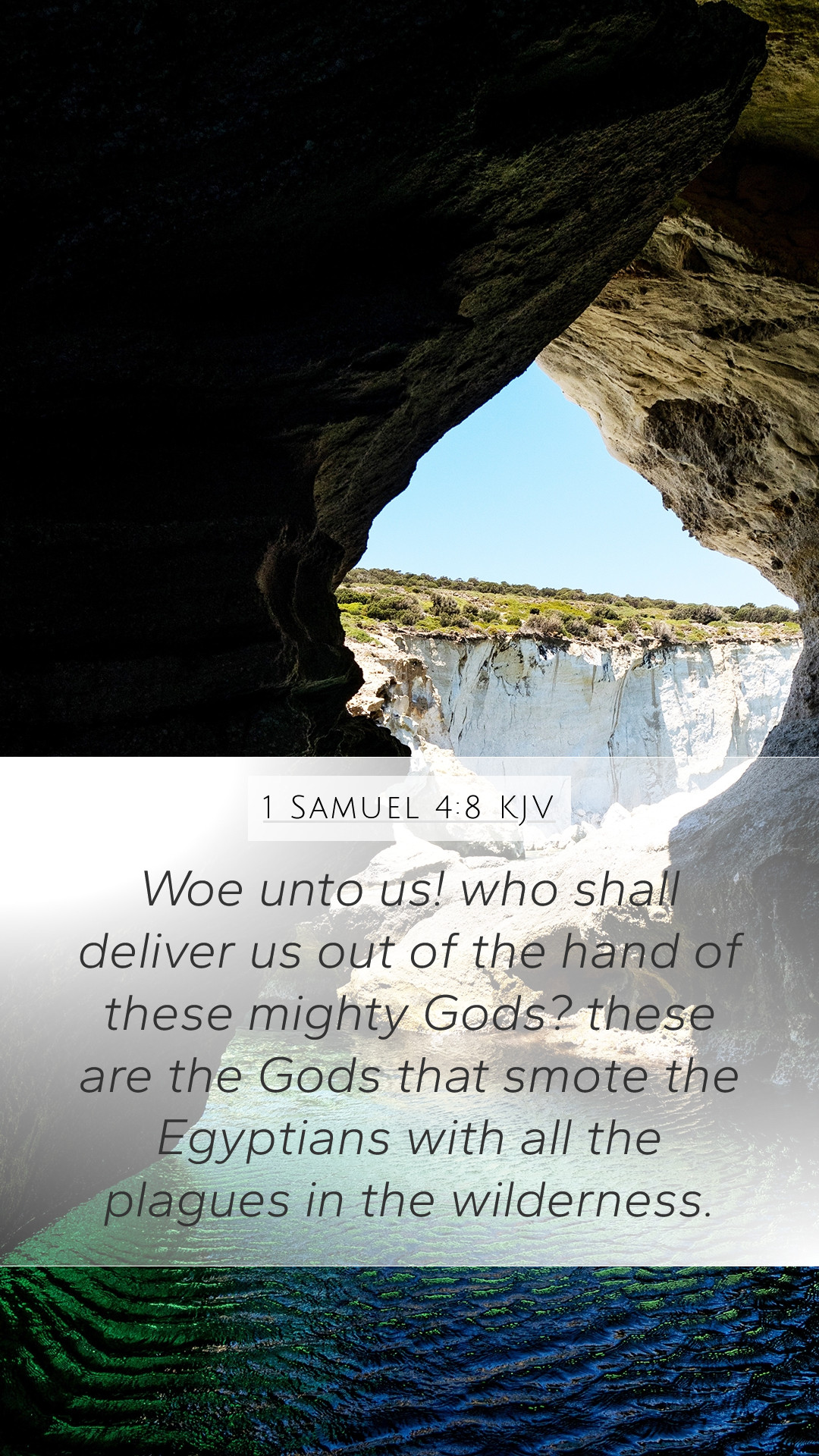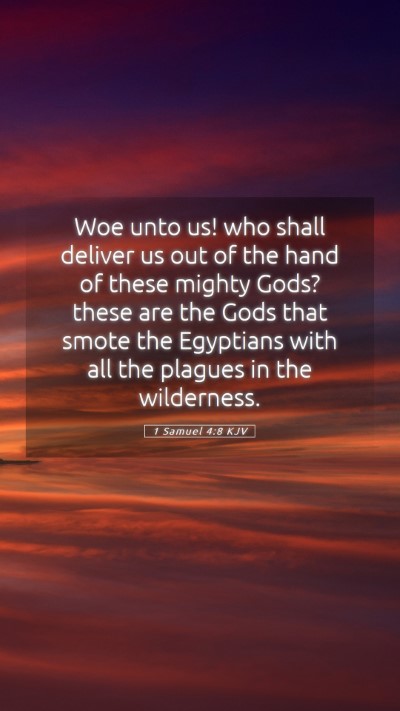Understanding 1 Samuel 4:8 - A Comprehensive Commentary
The verse 1 Samuel 4:8 states: "Woe unto us! who shall deliver us out of the hand of these mighty gods? These are the gods that smote the Egyptians with all the plagues in the wilderness." This verse is significant as it reveals the fear and despair of the Philistines upon witnessing the might of the God of Israel during the battle at Aphek.
Verse Analysis
This passage is part of a larger narrative regarding the Ark of the Covenant and its significance in Israel's history. Analyzing this verse provides insights that can enhance our understanding of the dynamics between the Israelites and the Philistines, as well as God's direct involvement in their conflicts.
Fear of the Philistines
The utterance "Woe unto us!" reflects immediate recognition of their precarious situation. Matthew Henry comments that the Philistines understood they were battling against not only a nation but a divine power that unleashed devastating plagues upon Egypt, and now they feared similar consequences. This historical context reveals a crucial aspect of how these ancient nations viewed the divine influences on their lives.
Divine Retribution
The term "mighty gods" here emphasizes the power attributed to the God of Israel, as opposed to their own deities. Albert Barnes notes that there is a clear acknowledgment of the past plagues which God executed upon Egypt as a demonstration of His supremacy. The Philistines recognize that they are outmatched, showcasing their spiritual understanding, albeit from an outsider's perspective.
The Role of the Ark of the Covenant
Adam Clarke elaborates on the symbolism of the Ark during battles, indicating it as a sign of God's presence among the Israelites. The dread of the Philistines is a direct response to the arrival of the Ark, indicating that they associated it with Israel's previous victories and God's direct intervention in their affairs.
Implications of the Verse
This verse serves as a pivotal moment for both the Israelites and the Philistines. It marks a confrontation of faith and acknowledgment of divine power that transcends human capabilities. It offers critical insights into the nature of conflict and the consequences of neglecting divine authority.
Spiritual Insights
- Recognition of Power: The Philistines' acknowledgment of Israel's God serves as a lesson in recognizing the sovereignty of God in all circumstances.
- Consequences of Disobedience: The plagues on Egypt serve as a reminder of the repercussions that come when opposing God.
- Moral Responsibility: Even enemies of Israel reflect on their actions and the moral implications of their war against God's people.
Applications in Daily Life
For contemporary readers, this scripture relates closely to how we perceive challenges in our lives. The fear exhibited by the Philistines can reflect our own apprehensions toward adversities. Understanding that God is sovereign can provide comfort and assurance in facing life's battles.
Study and Reflection
- How to Apply: Reflect on the areas of life where fear may overshadow faith. Consider the 'gods' in our lives that may present themselves as formidable.
- Bible Study Insights: Explore the historical context of the Israelites and Philistines and how their interactions exemplify broader spiritual truths.
- Engage in Bible Study Groups: Discuss the verse with others, using it as a foundation to explore themes of divine power and faithfulness.
Cross References
- Exodus 12:12: God's judgment on Egypt through the plagues.
- Joshua 2:9-11: Acknowledgment of God's power among the nations, showing His reputation.
- 1 Samuel 5:7: The Philistines' realization of God's power after taking the Ark.
Conclusion
The commentary on 1 Samuel 4:8 reveals profound insights into the nature of God, the reality of spiritual warfare, and the importance of recognizing divine authority. By engaging with the fear and understanding of the Philistines, we can learn about the consequences of opposing God and the nurturing of faith amidst life's battles. This verse encourages believers to deepen their understanding of Scripture and explore the relationship between divine intervention and human response through the lens of biblical exegesis and study.


